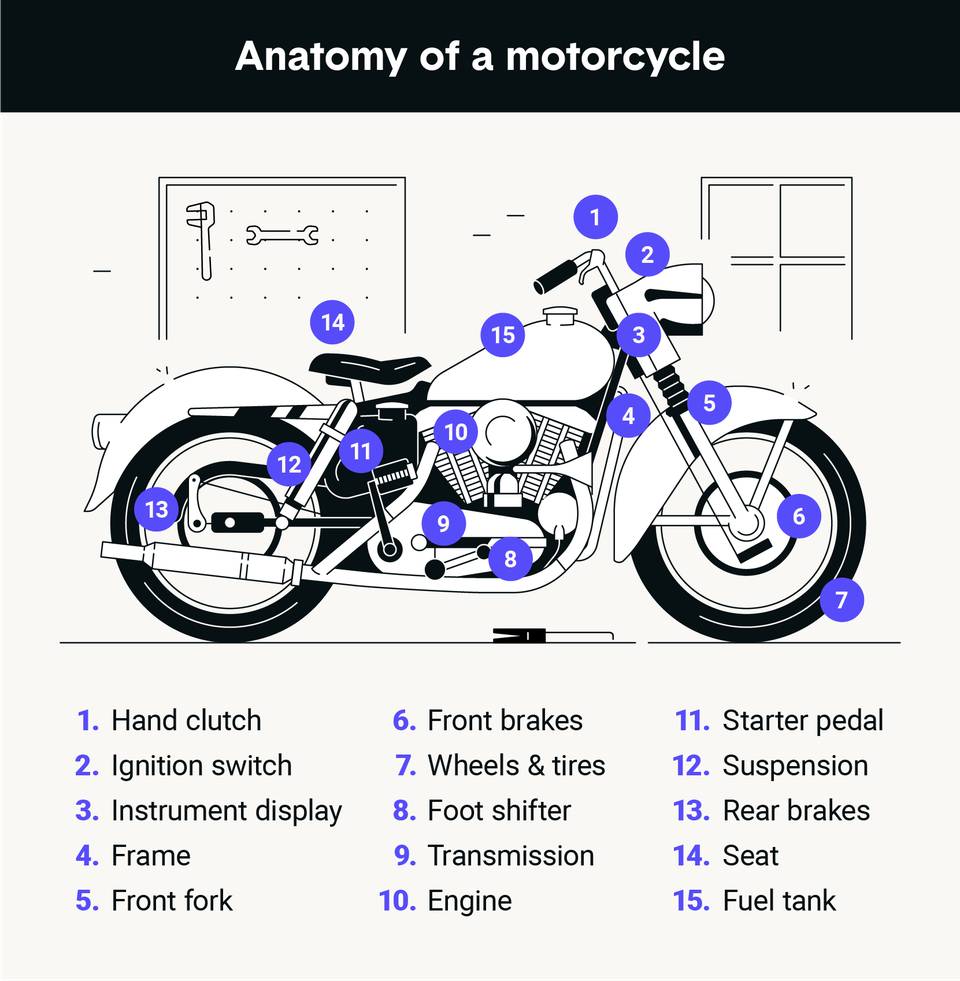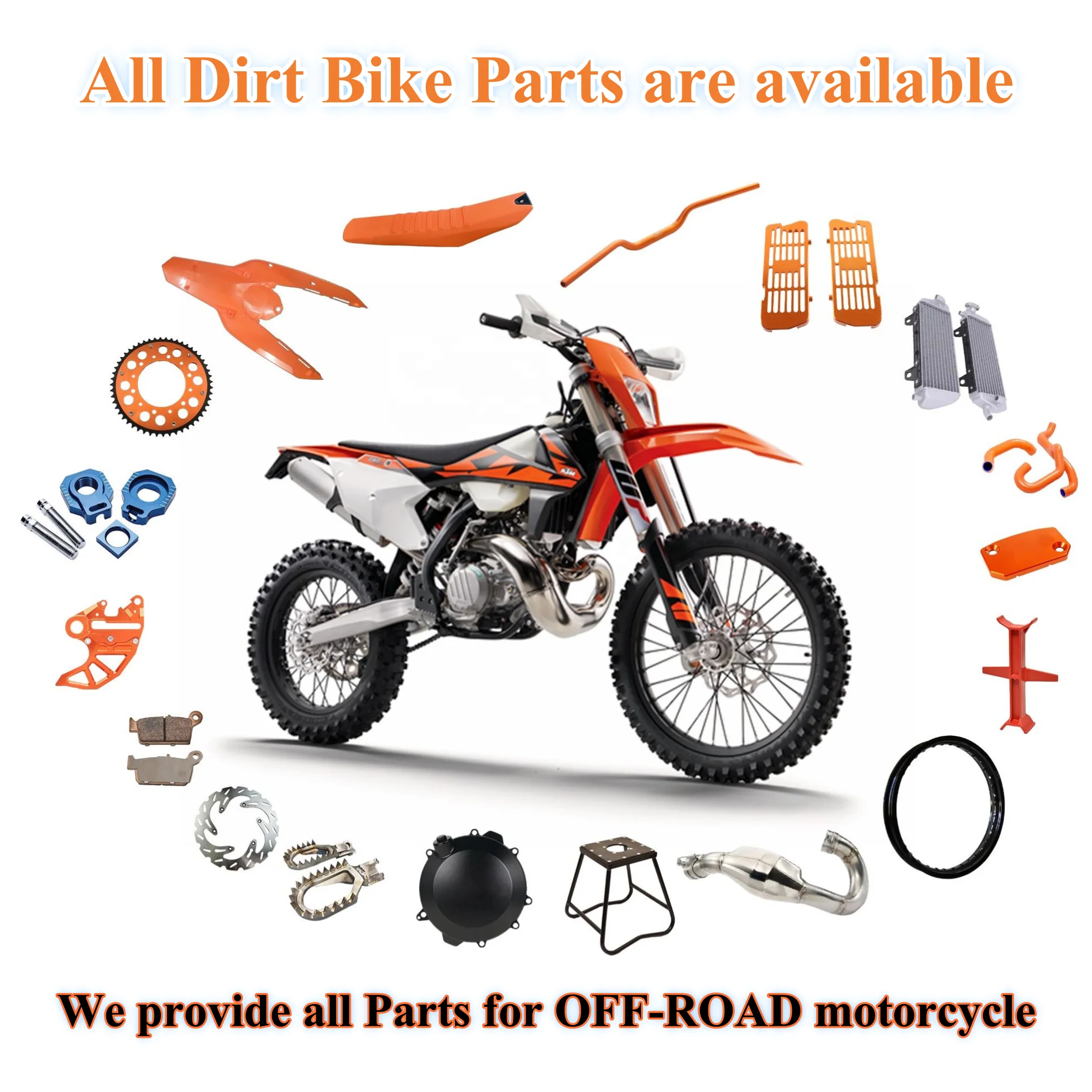Why Riders Trust Only Dealer-Certified OEM Parts New Zealand for Long-Term Value
Why Riders Trust Only Dealer-Certified OEM Parts New Zealand for Long-Term Value
Blog Article
Discover the Crucial Motorcycle Parts You Need for Ideal Efficiency
Recognizing the important parts of a bike is essential for accomplishing peak performance. Each part, from the engine to the braking system, plays a vital role in overall capability and security. Regular maintenance can avoid unforeseen failings and boost the riding experience. However, numerous bikers overlook the complexities of these systems. Discovering just how they work with each other can bring about an extra efficient ride. What essential parts should every motorcyclist prioritize?
The Engine: The Heart of Your Motorcycle
The engine offers as the core component of a motorcycle, driving its performance and defining its capabilities. It is accountable for transforming fuel into power, which powers the bike forward. Different sorts of engines are employed, including single-cylinder, V-twin, and inline arrangements, each offering distinct attributes suited for various riding styles and purposes. The engine dimension, typically measured in cubic centimeters (cc), significantly influences performance, with larger engines typically supplying even more power and torque.Furthermore, the engine's style and innovation, such as gas shot systems or air-cooling versus liquid-cooling, impact performance and dependability. Maintenance is important for peak operation; elements like routine oil changes and checking ignition system guarantee durability. Cyclists commonly take into consideration an engine's responsiveness and smoothness, as these characteristics enhance the overall riding experience. Ultimately, the engine remains a critical aspect that specifies not only the motorcycle's performance however also the rider's link to the maker.
The Transmission: Changing Gears Efficiently
The transmission plays an important duty in a motorcycle's efficiency, particularly in the mechanics of gear changing. Comprehending how to shift equipments efficiently can improve the overall riding experience, while routine maintenance guarantees peak functionality. Proper attention to these aspects can substantially affect the long life and performance of the bike.

Equipment Shifting Mechanics
Smooth equipment moving is vital for optimal motorcycle efficiency, considerably affecting both acceleration and control. The auto mechanics of equipment shifting include the communication between the clutch, gear bar, and transmission system. When a biker involves the clutch, it disengages the engine from the transmission, enabling a gear change without harming the components. A well-timed launch of the clutch, incorporated with exact activity of the gear bar, helps with a seamless change in between equipments. This procedure guarantees that the engine runs within its best power band, enhancing performance. Motorcycle Spares Christchurch. In addition, recognizing the equipment proportions and their result on speed and torque can help bikers make educated options during shifts, eventually adding to a much more responsive and satisfying riding experience
Upkeep Tips Importance
Regular upkeep plays a necessary role in ensuring that the transmission system operates successfully, enabling for smooth equipment changes. Routinely changing the transmission and inspecting liquid is vital, as old fluid can result in raised friction and wear. Additionally, examining the clutch for wear warranties peak involvement and disengagement, avoiding slippage throughout equipment modifications. Lubrication of moving components is equally important to minimize rubbing and boost performance. Motorbike owners ought to also monitor for leaks and unusual sounds, as these can show underlying concerns. By adhering to these maintenance suggestions, riders can prolong the life expectancy of their transmission system, ensuring that equipment shifts stay smooth and adding to the general efficiency of their motorcycle.
The Braking System: Ensuring Safety on Every Trip
Braking systems are essential elements that directly influence a motorbike's security and performance. They contain numerous components, consisting of brake pads, blades, calipers, and hydraulic lines, all working with each other to assure efficient slowdown. The sort of stopping system-- commonly either disc or drum-- influences responsiveness and quiting power.Regular upkeep is vital to promote peak efficiency; used brake pads can cause lowered efficiency and enhanced stopping distances. In addition, the top quality of brake fluid need to be checked, as it can take in wetness over time, compromising braking efficiency.Riders ought to also consider the importance of anti-lock stopping systems (ABDOMINAL MUSCLE), which avoid wheel lockup during sudden stops, enhancing general security. Effectively operating brakes are not almost quiting; they infuse confidence in the biker, allowing for much safer navigation via different terrains. Inevitably, a reliable stopping system is critical for enjoying every ride with assurance.
The Suspension: Enhancing Convenience and Control
A well-functioning suspension system considerably adds to a motorcycle's total performance, enhancing the effectiveness of the braking system. The suspension plays a substantial function in soaking up shocks from uneven surface areas, assuring a smoother trip while preserving tire contact with the road. This call is vital for both stability and control, permitting cyclists to browse corners with confidence and precision.Different kinds of suspension systems, such as telescopic forks or mono-shocks, use varying levels of comfort and handling. Effectively tuned suspension enhances responsiveness, offering the cyclist with a more linked feeling to the motorbike. Regular upkeep checks are very important to determine the suspension parts, consisting of dampers and springtimes, are functioning at their finest. An efficient shock absorber not only raises the riding experience however additionally adds to the longevity of other motorbike components by minimizing wear and tear. Therefore, buying top quality suspension is essential for any major motorbike lover.
The Tires: Linking You to the Roadway
Tires play a necessary duty in a motorcycle's efficiency, acting as the main link between the biker and the road. Understanding the various sorts of tires available can substantially affect taking care of and security. In addition, routine maintenance is vital to assure peak tire performance and durability.
Tire Keys In Explained
How do different tire types affect a motorbike's performance? Tire kinds play a crucial role in establishing a motorcycle's stability, grasp, and handling. Sporting activity tires, made for high performance, offer enhanced traction and responsiveness on smooth roadways, making them suitable for competing and aggressive riding. Alternatively, exploring tires prioritize longevity and comfort, supplying a smoother experience for long-distance travel. Off-road tires, characterized by their sturdy tread patterns, master traction on unpaved surfaces, suitable for journey fanatics. Furthermore, dual-sport tires blend qualities from both off-road and on-road categories, satisfying versatile riding demands. Inevitably, choosing the appropriate tire type is crucial for optimizing efficiency, ensuring safety, and enhancing the overall riding experience.
Maintenance Tips Offered
While riding on the road, maintaining perfect tire problem is essential for safety and security and efficiency. Regularly examining tire stress is very important, as under-inflated tires can result in bad handling and increased wear. It is a good idea to check walk deepness frequently; worn tires compromise hold and security. In enhancement, cyclists need to look for indicators of damages, such as cracks or bulges, which can show the need for replacement. Revolving tires occasionally guarantees even use, enhancing durability. Moreover, keeping tires tidy from particles and avoiding excessive curbs can lengthen their life-span. Maintaining appropriate positioning and balance contributes to peak performance, reducing stress and anxiety on other bike elements. Sticking to these upkeep ideas will substantially boost the general riding experience.
The Gas System: Sustaining Efficiency and Effectiveness
The gas system plays view website an important duty in taking full advantage of a motorcycle's efficiency and efficiency, as it ensures the optimum delivery of fuel to the engine. It comprises numerous vital parts, consisting of the gas tank, fuel pump, fuel filter, and gas injectors check it out or carburetor. Each part should operate efficiently to guarantee a powerful and smooth ride.The fuel tank shops gas and provides it to the engine through the gas pump, which produces the necessary stress. A gas filter stops pollutants from going into the engine, while the injectors or carburetor mix fuel with air for combustion.Proper maintenance of the gas system is critical; a clogged up filter or malfunctioning injector can lead to decreased efficiency and boosted fuel usage. By confirming that the fuel system runs efficiently, bikers can enjoy better throttle reaction, better gas economic climate, and generally boosted riding experience.
The Electrical System: Powering Your Trip
An effective electric system is vital for the total capability and safety and security of a motorcycle, as it powers essential components such as the ignition, illumination, and various electronic systems. This system includes the battery, which shops energy, and the alternator, in charge of producing power while the engine runs. The wiring harness connects these elements, making sure reliable power distribution.Additionally, fuses shield the system from overloads, while relays assist control high-current tools with low-power signals. A well-maintained electric system enhances efficiency by making sure smooth starts and constant operation of signals and lights, vital for motorcyclist presence and safety.Regular checks of the battery's fee and connections are very important for preventing electrical failures. Riders must also evaluate electrical wiring for damage, ensuring all elements operate preferably. Inevitably, a robust electric system contributes significantly to the total efficiency and reliability of the motorcycle.
Often Asked Concerns
Just how Frequently Should I Change My Motorbike's Battery?
The regularity of bike battery substitute depends on usage and maintenance (Oem Parts New Zealand). Generally, batteries should be replaced every three to five years. Normal checks can assist recognize when a substitute is essential for peak efficiency
What Devices Do I Need for Standard Motorbike Maintenance?
For fundamental motorcycle upkeep, one calls for crucial tools such as a socket set, wrenches, screwdrivers, pliers, tire pressure gauge, and a torque wrench. These tools assist in reliable maintenance and assure the motorcycle runs efficiently and safely.
How Can I Improve My Motorcycle's The rules of aerodynamics?
To boost motorcycle the rules of aerodynamics, one must take into consideration readjusting fairings, using windscreen extensions, enhancing body position, and minimizing total weight. These modifications help reduce drag, improving stability and fuel performance during experiences.
What Are the Indicators of a Failing Electrical System?
Indicators of a falling short electric system consist of lowering lights, difficulty starting, uneven tool analyses, and blown integrates. Motorbike Components NZ. Uncommon smells or rust around battery terminals may likewise indicate underlying problems requiring instant focus for security and efficiency

Just how Do I Pick the Right Oil for My Motorcycle?
When selecting oil for a motorcycle, one need to think about the supplier's specs, thickness scores, and the kind of riding. In addition, artificial versus traditional oil can affect performance and engine defense, affecting the decision greatly. The engine dimension, usually measured in cubic centimeters (cc), substantially influences efficiency, with larger engines usually giving even more power and torque.Furthermore, the engine's design and modern technology, such as fuel shot systems or air-cooling versus liquid-cooling, impact performance and dependability. A well-functioning suspension system greatly adds to a motorbike's total performance, enhancing the efficiency of the braking system. The fuel system plays a crucial duty in making the most of a motorbike's efficiency and effectiveness, as it ensures the ideal delivery of fuel to the engine. A try this site fuel filter protects against contaminants from getting in the engine, while the injectors or carburetor mix gas with air for combustion.Proper upkeep of the gas system is vital; a clogged filter or malfunctioning injector can lead to lowered efficiency and increased gas consumption. A well-maintained electric system boosts efficiency by making certain smooth begins and regular operation of signals and lights, vital for cyclist visibility and safety.Regular checks of the battery's fee and links are essential for protecting against electric failings.
Report this page